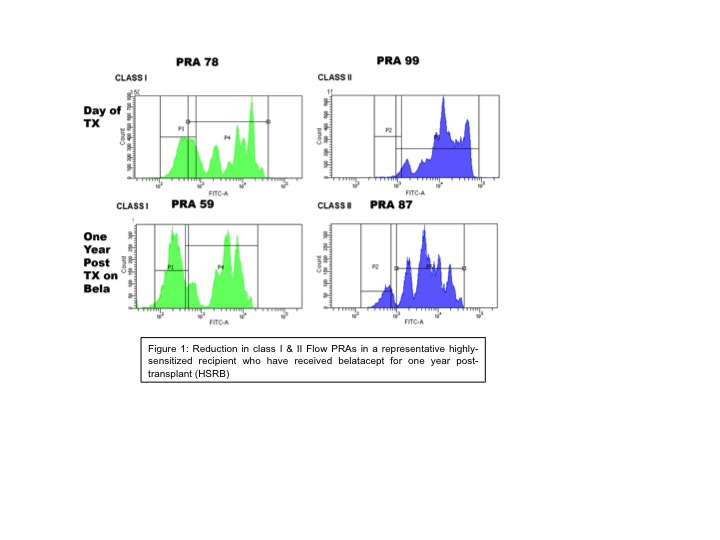The Impact of Belatacept on Anti-HLA Antibodies of Highly Sensitized Kidney Transplant Recipients.
Emory Transplant Center, Atlanta, GA
Meeting: 2017 American Transplant Congress
Abstract number: A48
Keywords: Alloantibodies, Kidney transplantation
Session Information
Session Name: Poster Session A: Clinical Science: Kidney Immunosuppression: Desensitization
Session Type: Poster Session
Date: Saturday, April 29, 2017
Session Time: 5:30pm-7:30pm
 Presentation Time: 5:30pm-7:30pm
Presentation Time: 5:30pm-7:30pm
Location: Hall D1
Background: Anti-HLA antibodies often prevent successful organ transplantation. Interestingly, belatacept limits de novo antibody production within the germinal center, but its impact on long-lived plasma cells (LLPCs) and thus preformed antibodies has not been well characterized. Recently, the CD28 signal was reported as a requirement for the survival of LLPCs and a sustained antibody response.
Methods: This study tested the hypothesis that highly sensitized kidney transplant recipients on belatacept have a loss of anti-HLA antibodies at one year after transplant. We selected for analysis the first 38 kidney transplant recipients transplanted at our institution after 12/4/2014 with a CPRA ≥ 98% (including 16 re-transplants), who remained on belatacept consecutively for one-year.
Results: We compared the class I and II Flow PRA profiles pre-transplant and one year post-transplant. Reductions in the Flow PRAs were found in 63% (24/38) for class I and 55% (21/38) for class II. A definitive drop in fluorescence intensity (left shift) and noticeable change in antibody architecture for class I and II is apparent in Figure 1.  Furthermore, we identified a loss of antibody specificities using single antigen bead analysis. Our threshold to consider an antigen unacceptable was 2000 MFI (>2000: red bars, <2000: orange bars) and a loss of antibody to A23/24 and DR4 specificities is shown in Figure 2. Finally, we analyzed the CPRA in nine patients, who had a visual change in Flow PRA. We found that the CPRA decreased in 8 of 9 cases (non-responder 100 vs. responder 30-97.9) [Figure 2E].
Furthermore, we identified a loss of antibody specificities using single antigen bead analysis. Our threshold to consider an antigen unacceptable was 2000 MFI (>2000: red bars, <2000: orange bars) and a loss of antibody to A23/24 and DR4 specificities is shown in Figure 2. Finally, we analyzed the CPRA in nine patients, who had a visual change in Flow PRA. We found that the CPRA decreased in 8 of 9 cases (non-responder 100 vs. responder 30-97.9) [Figure 2E].  Conclusion: The data presented here, while preliminary and warranting further investigation, suggests that belatacept may have an association with a loss of preexisting anti-HLA antibodies in the post-renal transplant recipient.
Conclusion: The data presented here, while preliminary and warranting further investigation, suggests that belatacept may have an association with a loss of preexisting anti-HLA antibodies in the post-renal transplant recipient.
CITATION INFORMATION: Parsons R, Decker H, Pearson T, Larsen C, Bray R, Gebel H. The Impact of Belatacept on Anti-HLA Antibodies of Highly Sensitized Kidney Transplant Recipients. Am J Transplant. 2017;17 (suppl 3).
To cite this abstract in AMA style:
Parsons R, Decker H, Pearson T, Larsen C, Bray R, Gebel H. The Impact of Belatacept on Anti-HLA Antibodies of Highly Sensitized Kidney Transplant Recipients. [abstract]. Am J Transplant. 2017; 17 (suppl 3). https://atcmeetingabstracts.com/abstract/the-impact-of-belatacept-on-anti-hla-antibodies-of-highly-sensitized-kidney-transplant-recipients/. Accessed February 7, 2026.« Back to 2017 American Transplant Congress
